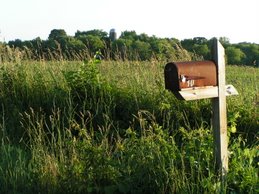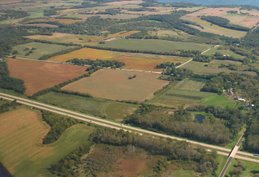Submitted by Phyllis Hasbrouck
I must recommend Fitchburg Plan Commission meetings to FitchburgVoices readers. Though Terry Carpenter and I are sometimes the only people there who aren’t either elected officials or someone putting up a new deck or trying to get a liquor license, it isn’t as boring as you probably imagine. You really learn a lot: about the people who make decisions for you; about planning topics; and about politics.
This last meeting on Sept 18 was especially interesting.
There was high drama (for the connoisseur who knows how rare it is) when the Plan Commission voted 5 to 1 against Mayor Tom Clauder, to send the draft map for a 50-year Urban Growth Boundary on the Common Council. Sitting in the audience, knitting a purple scarf, I felt torn. On the one hand, I appreciated the Mayor referencing the West Waubesa Preservation Coalition’s statement of “We don't have to rush this.” The truth of that statement still stands: there is no rush in approving more development when there is a housing glut in Fitchburg, and water questions remain unanswered.
On the other hand, the comments of the other commissioners resonated much more strongly with me. In response to the Mayor’s plea to “Let the market do the growth,” John Freiburger answered very strongly, “If you want to see the market, go to Houston!” He painted a picture of unplanned growth gone wild, and said that real estate courses now point to Houston as an example of why zoning and planning are necessary.
Jay Allen agreed, saying that the problem with saying “Let the market decide” is that “you end up destroying wetlands,... creating problems with lakes and streams, you end up with fly ash dumps" and "all sorts of transportation problems.” He also indicated that he would like to make a plan to incorporate lower income housing into new neighborhoods, and to take a closer look at groundwater issues.
Ed Kinney defended the map as it stood, and said, “We put together a map that identifies the areas of Fitchburg that best meet those parameters." (Now I'm paraphrasing.) This map takes the politics out of the planning process.... We make it clear.... Of course, there are going to be changes to the map.... If you don’t want to be bothered by more proposals like Ballygrady, then vote for this plan. Otherwise, you open the door for politics.”
Al Cooper agreed that it was time to pass the plan on, as work expands to fill the time allotted.
And Mark McNally, though he was clearly uncomfortable abandoning the Mayor, seemed to be convinced by the other commissioners. When he asked for just 2 weeks delay to let the Mayor meet with the superintendent of the Oregon School District, John Freiburger said, “The Oregon School District cannot tell us how to plan. If we wait 2 weeks, in 2 weeks there will be another argument, and then another.”
In the end, they all voted yes except the Mayor, who said (I think) “With deep inner resolution, No.”
For me, it was a mixed bag. I totally agreed with the motivations expressed in favor of planning, and yet it was painful to see the Northeast Neighborhood (NEN) being included as part of the Urban Growth Boundary. I just have to take comfort in John Freiburger’s statement that “We’re showing the Northeast Neighborhood all in red, but we all know that we’re not going to develop it all.”
But there was one topic that I disagree with John on. He said that you can’t make plans for traffic until you’ve agreed on a map of where the development will take place. City Planner Tom Hovel concurred, saying, “Traffic studies don’t tell you ‘Don’t grow there.’ They tell you how to accommodate your traffic.”
I assume that he’s right in saying that (so far) traffic studies haven’t said, “Don’t grow there.” That probably has something to do with the mindset of traffic engineers, who can always envision a wider road, more on and off ramps, or a new frontage road. But maybe elected leaders should say “This traffic study indicates that we shouldn’t grow there,” if they see that the accommodation measures would violate certain values that the community holds dear.
Take, for example, the case of the Northeast Neighborhood. With only two possible routes into Madison, (the destination of choice for most of the tens of thousand of daily car trips that development will cause), the measures necessary to accommodate that traffic need to be looked at carefully before approving development.
At a meeting last summer with the Dept. of Transportation and Fitchburg officials, widening Hwy. MM to four lanes, or even six lanes, was discussed. They called it “improving” MM, but I wonder if the scores of people with houses on it would feel improved by having a highway in their front yard.
And the people who enjoy the Lussier Family Heritage Center, Lake Farm Park, the Capital Springs Centennial State Park and campground, or the Capital City Bike Trail, might like to know sooner rather than too late that Lake Farm Park Road will become clogged with traffic as people try to avoid the Hwy. 14 and Park Street jams caused by the NEN traffic.
Sure, a traffic engineer could tell you to improve traffic flow by making Lake Farm Park Road four lanes wide, but how does that mix with the quiet, rural experience that people seek when they go there? Of course, Fitchburg wouldn’t have to pay for that “improvement” or deal with the landowners who don’t want to move their houses, because it’s in the Town of Blooming Grove and the City of Madison. But, as Jay Allen has so rightly said, (in the case of the planned Grandview development on Fitchburg’s western border) it isn’t fair for one community to create a development that will pile transportation problems and costs on their neighbors.
If we talk about these clearly foreseeable traffic problems before approving a development, people have a chance to make their wishes known to Fitchburg alders and planners. And that’s what our system is all about: democracy – rule of the people. Hmmm… that reminds me of some very disturbing comments made at the end of this most interesting meeting. More on that later, so please stay tuned.
Thanks to all who read these words for taking the time to become informed. I hope to see you at the next Plan Commission or Common Council meeting!
Monday, October 1, 2007
Politics and Planning
Posted by
Terry Carpenter
at
4:00 PM
![]()
Categories NEN, Plan Comm Meetings, Transportation



No comments:
Post a Comment